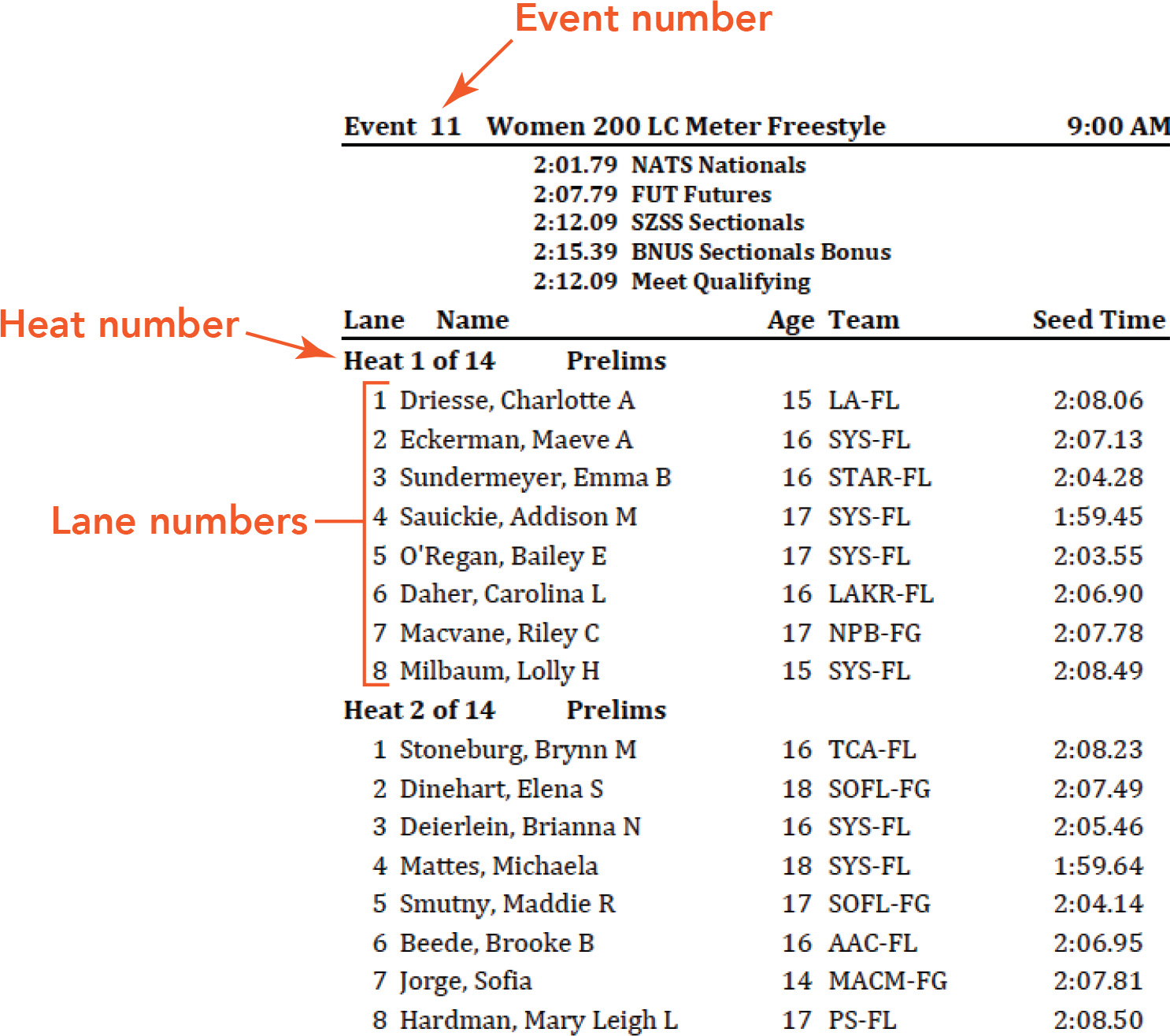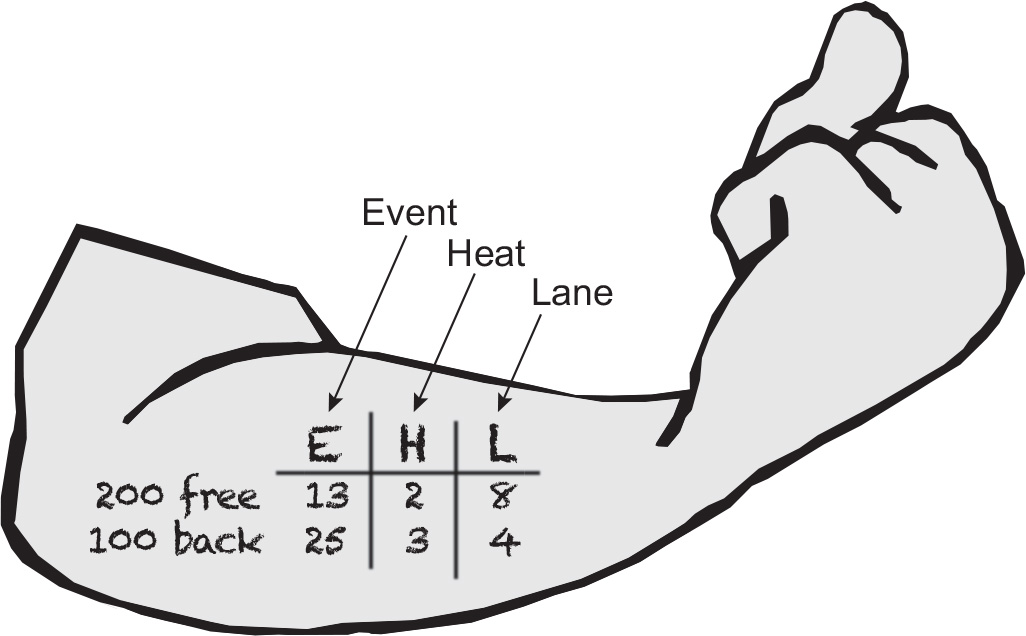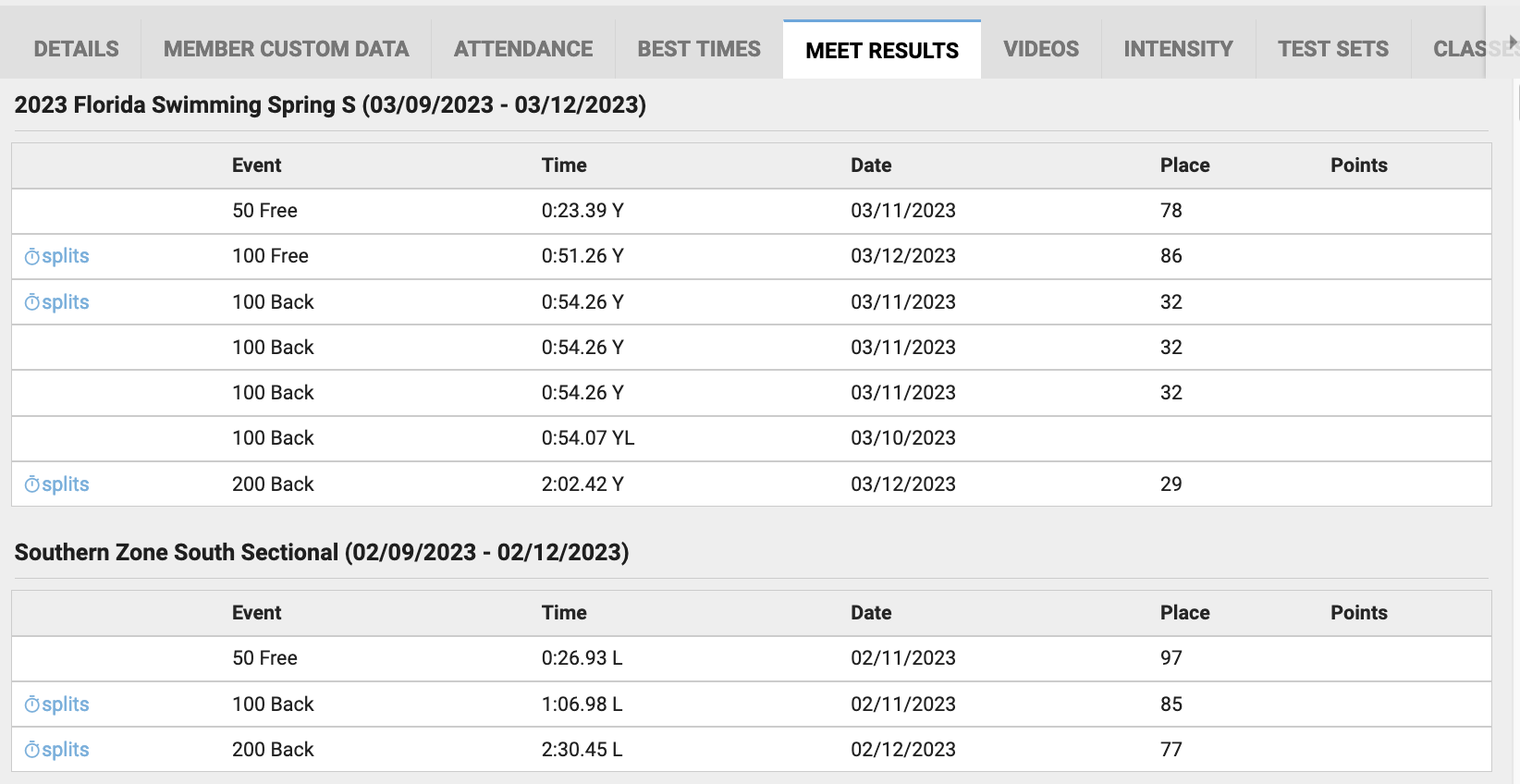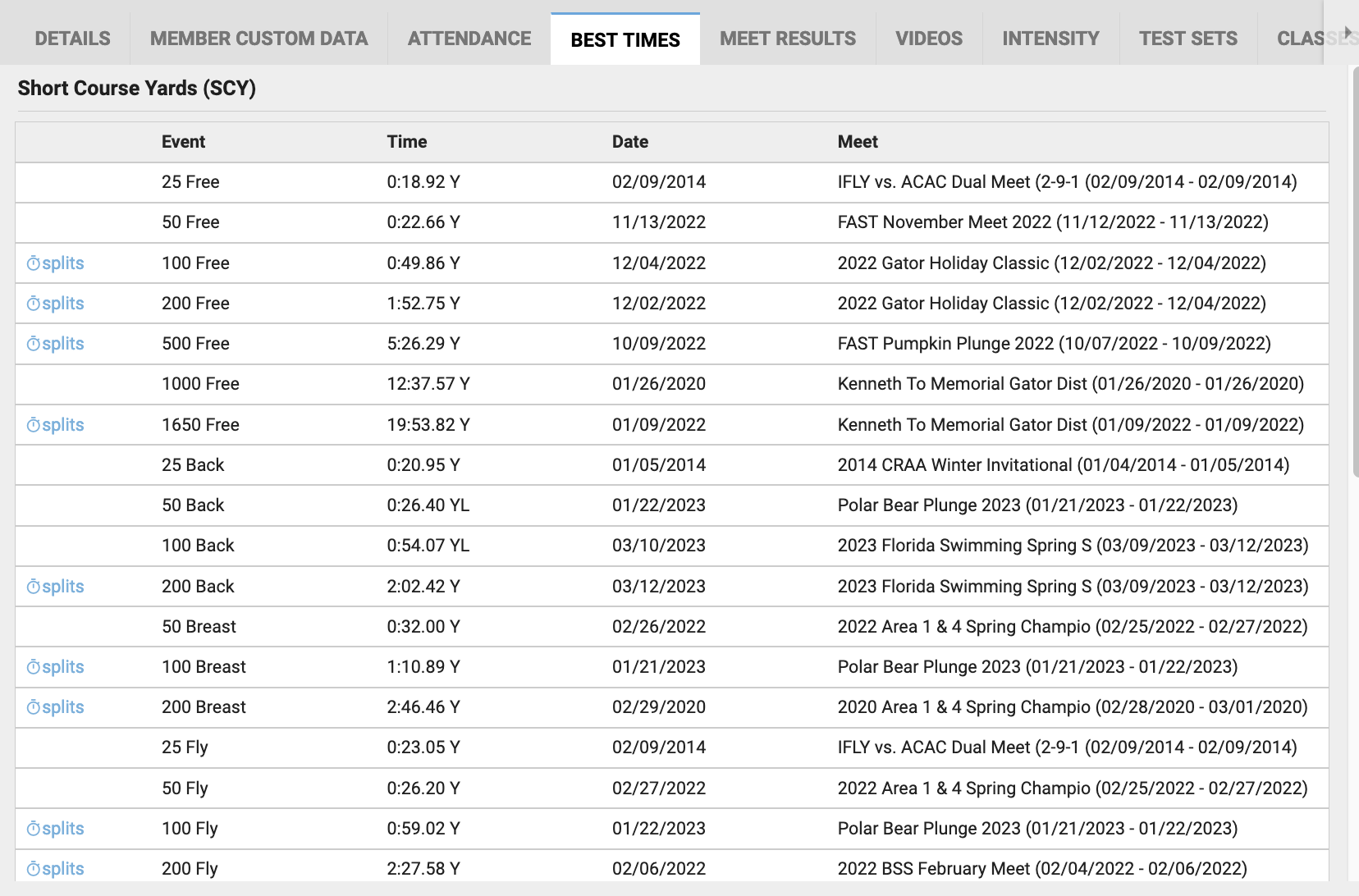Swim Meet 101
New to swimming as a sport for your child? Meets can seem intimidating but some basics can help you navigate the process of signing up and attending swim meets.
Also check out GSC's Glossary of Swimming for definitions of the terms and jargon you will hear as you enter swim-parent-hood!
The GSC staff is here to answer your questions too, so please reach out if we can help!
Contents
Attending meets is an important part of the sport of swimming. Meet competition allows swimmers and parents to see the results of the time and effort put into going to practice! As professionals in the sport, our coaches know that statistically speaking children are more likely to stay with competitive swimming if they attend meets because meets are part of the reward system that drives them to continue to train and improve over time. Meets are also great opportunities for swimmers and swim parents to socialize and build friendships.
Gator Swim Club is a competitive swim team, so our practices are designed to train swimmers to be able to participate in and be successful at meets.
What are GSC's expectations for meet attendance?
Each group has an ideal/expected number of meets its members will attend, which increases as the swimmer progresses through the Developmental, Age Group, and Senior programs.
Each group has an ideal/expected number of meets its members will attend, which increases as the swimmer progresses through the Developmental, Age Group, and Senior programs.
-
Developmental 1: Swimmers can expect to compete in one intrasquad meet per season.
-
Developmental 2: Swimmers are encouraged to go to meets, scheduled at one per month, with a focus on Area 4 Championships as their season-ending meet.
-
Developmenal 3: Swimmers are encouraged to go to meets, scheduled at one per month, with a focus on Area 4 Championships as their season-ending meet.
-
Age Group 1: Consistent attendance at 1 meet per month is strongly recommended with focus beginning to be on achieving Florida Age Group Championship qualifying times.
-
Age Group 2: Swimmers should expect to regularly attend both in-season and the highest level championship meet for which they are qualified (FLAGS or Area Champs). Consistent participation for all days of each swim meet is started at this level, with focus on adding one or two prelim-final meets per season.
-
Age Group 3: Swimmers are expected to attend the majority of in-season meets, and are expected to attend the highest level championship meet for which they are qualified each season (FLAGS). They are focused on being able to race each event in a season to achieve an IMX score at the conclusion of the short-course and long-course seasons.
-
Senior Flex 1 and 2: Flex members are not required to go to meets, but competition is encouraged especially if swimmers wish to potentially move into one of the other Senior groups or to compete for their high school swim teams.
-
Senior 1, 2, 3: Senior swimmers are expected to attend all in-season meets and the highest level championship meet(s) for which they qualify each season (FLAGS, Senior Champs, Sectionals, Futures, Junior Nationals).
Club swimming is a year-round sport and the swim year is broken into two main seasons: short-course season (September through March) and long-course season (April through July). While some meets take place in early August, that month is usually without competition for most swimmers.
In the short-course season, competition takes place in a 25-yard pool. The shortest events in the short-course season are 25 yards in length, and the longest is the mile, which is 1650 yards. You may see the acronym "SCY" and this refers to "short course yards."
In the long-course season, competition takes place in a 50-meter pool. The shortest events in the long-course season are 50-meters in length, and the longest is the mile, which is 1500 meters. You may see the acronym "LCM" and this refers to "long course meters."
Home vs. Away
GSC hosts only a few meets per year, which are considered our "home" meets (see below for more information on GSC-hosted meets). We host these events at the O'Connell Center and at the FAST pool in Ocala. Most meets we attend are "away" in that they are hosted by other teams.
Intrasquads
Many GSC swimmers are first introduced to competition at our fall and spring intrasquad meets. These events are intended as an opportunity for our novice swimmers to become familiar with meet protocol and to experience the competition environment in a fun, low-pressure setting with only their coaches and teammates. Intrasquads are not sanctioned meets and the times do not count. These are the only meets that our Developmental 1 (Pre-competitive) swimmers can attend; Developmental 2 and 3 swimmers are encouraged to attend, and newer Age Group 1 swimmers may be invited to attend.
In-season meets
GSC's meet schedules include an average of one-meet per month that all groups except Developmental 1 can attend.
Most meets are multiple days in length with events spread across the days; it is not required to attend all days when swimmers are in the Developmental groups but as they get older and more experienced they are expected to commit to full meets.
Qualifier/championship meets
Some meets may have qualifying standards, meaning swimmers must have achieved specific time cuts to be eligible to swim events at those meets.
While some in-season meets have qualifying times, mostly this applies to the end-of-season championship meets; time standards will be posted to the GSC website and the meet schedule indicates when these standards apply.
Area Championships meets have "slower-than" qualifying times, in that they are intended as meets for those swimmers who do not qualify to attend the other championship meets. The events specifically exclude swimmers who have age-group or senior champs times already.
Open water meets
GSC will sometimes attend open-water meets, which are held in lakes or in the ocean. Events at these meets are longer, and coaches must deem the swimmer capable of competing in the open-water environment.
These are the basic elements of a meet format, but each meet is different. Be sure to check the meet information we post for the event order, which is usually the last few pages of the PDF showing how the sessions are broken up and which events are offered in each one.
Meet sessions
In-season meets will be structured into multiple sessions each meet day by swimmer age. Most often the older swimmers will compete in morning sessions and the younger swimmers in the afternoons. The host team decides how events are spread across the sessions, along with the age breakdown.
The most common meet session format is a Friday evening, then mornings and afternoons on Saturday and Sunday. The Friday evening session is often used for distance events only.
Meet events
Meet events are split into two broad categories: prelim-final and timed final.
Prelim-final events are those in which swimmers compete in a preliminary race and then the top set of swimmers return to compete again in an evening finals session. The number of swimmers invited to return for a finals swim varies by meet but is going to be at least 16. Prelim-final events are usually going to be restricted to swimmers age 11 and up.
Timed final events are those that swimmers compete in just once. Most events for swimmers age 10 and under are timed finals, as are most distance events (e.g., 500 freestyle, etc.).
Some meets are only prelims-finals, some are only timed finals, and some have a combination. For example, GSC's Holiday Classic meet offers preliminary events in the mornings for swimmers 11 and over, timed finals in the afternoons for swimmers 10 and under, and evening finals for those 11-and-over swimmers who qualified for the second swim.
Each season’s meet schedule is posted to the team’s website under the Meets tab so you can plan out the dates ahead of time. The schedule shows dates, location, groups that can attend for each meet GSC will attend.
Once we receive it from the host team, each meet listed on our website will have a “meet info” file posted on the "Meet Info for Parents" page. These files have LOTS of information in them, but most of it is for the coaches and officials as it pertains to the structure of the meet. The main things you will want to look at are:
- date(s)
- location
- fees
- and event order (which includes the breakdown of events by meet session and day)
Something that sets swimming apart from other youth sports is that competitions are an additional cost to families, unlike the soccer match or football game that is just included with participation. The main reason for this is that rather than increasing fees for all members in order to cover the cost of the team's participation in meets, this structure charges only those who attend competitions.
Meet fees will always include a per-event fee and a number of per-swimmer fees:
-
Per individual event:
-
In-season meets: $5.50 max per timed final event, $8.50 max per prelim-final event
-
Championship meets: $10–15 max per event
-
If your swimmer is entered in 3 events, your total cost for the meet will include 3 x event fee
-
-
Facility fee: per swimmer (usually $10-$15)
-
Electronic heat sheet fee: per swimmer (usually $3)
-
LSC Swimmer Support: $1 per swimmer, state championship meets only
GSC also applies a surcharge for meets that we don't host, as it helps cover the costs of sending coaches to those meets. The fee is $10 per swimmer per full meet day, regardless of the number of days the swimmer attends. For example, if your swimmer is entered in a meet that has a Friday evening session and then two full days Saturday and Sunday, the GSC surcharge would be $20. This fee does not charge anything for the single-session Friday as it not a full meet day; if your swimmer only attends on Saturday, you would still incur the $20 fee.
If a meet offers relay events, GSC creates the relay groups and the team pays those event fees.
When it comes to meet participation, you definitely get more for your money by attending for as many meet days as possible because the host per-swimmer fees and GSC surcharge are fixed.
GSC pays the fees for all of our swimmers when we arrive at the meet, and then we put each individual swimmer's meet fees onto GSC accounts that month. For a meet in September, fees will be part of your autopayment to GSC on October 1, fees for an October meet ar charged on November 1, and so on.
When sign-up opens for meet, you will receive an e-mail from the system noting the meet is open and providing a sign-up deadline.
Please watch your e-mail for notifications about commitment deadlines for the meets. We are not able to accommodate late entries.
GSC's process is that parents commit their swimmers to attend a meet (choosing the day or days) and then our coaches choose the events. Coaches make event decisions considering many factors based on their training plans and what they wish to see each athlete swim at a given point in the season. Coaches also choose events that may challenge the swimmer to go beyond what he/she might feel capable of, but the coaches know what the kids can do even if the swimmers might be nervous about an event. Coaches will never put swimmers in an event they are not ready for!
If your swimmer has competed in an event before, his/her best time will be used as the new meet's entry time. If your swimmer has not competed in a given event before, you will see "NT" in place of the time and that just indicates "no time."
Before the deadline to submit entries to the host team, we will send out an entry report showing the coach event choices for each swimmer.
- The entry report gives parents a chance to confirm that swimmers are entered in the days/sessions you plan to attend.
- While parents and swimmers can send in feedback on event choices, coach decisions are final.
The entry report review deadline is the latest time you can remove your swimmer from the meet or drop a day. Once entries are sent in to the host team any fees will be charged even if plans change and you don’t attend; this is because we have by that time committed attendance to the host team and have to pay our fees to them regardless of how many of our swimmers actually attend and compete.
In the week before the meet, GSC will send out important information including a team itinerary (where to be and when, what to bring, etc.) and coaching requests. If there is anything you are unsure of, please ask! Other things that will be sent out are the psych sheet and the heat sheet. The psych sheet is a list of swimmers entered in each event from the fastest entry time to the slowest; heat sheets that list each event, heat, swimmer name, and his/her assigned lane:

Be sure your swimmer gets enough rest in the days before the meet! It is NOT recommended that swimmers skip practice the day before a meet to get extra rest; we do meet warm-up practices on those pre-meet days, and those swims are important preparation for competition.
In preparing for a meet, you will want to pack the things your swimmer needs, including the following:
-
Team cap and suit
-
Goggles (an extra pair is always a good idea!)
-
A couple of towels
-
Sunscreen for outdoor meets
-
Water bottle to stay hydrated
-
Warm clothes to put on between events, including shoes, especially for cold-weather meets
-
Snacks should be light, healthy food—no junk food!
-
Shoes to wear between events and for on-land warm-up
For some meets we will ask swimmers to bring a folding chair if there is no bleacher seating for athletes. Be sure to check the itinerary items to pack specifically for that meet.
You will also want to prepare the things you need to be comfortable at the meet! Swim meets can be long and hot, so the more prepared you are, the more you will enjoy the experience too. Suggested items include the following:
-
Foldable outdoor chairs
-
Pop-up tents/canopies for shade/shelter from rain
-
Highlighters for heat sheets and sharpies for event-marking swimmers
-
Snacks and water bottles
-
Sunscreen and bug repellant for outdoor meets
It is helpful to write your child’s event information on their arm or leg to give them a reminder of which events they are swimming as well as which heat and lane they are in. This is best done with a sharpie, and should be done on dry skin. Here is a sample:

As swimmers get older they are less interested in having the event lists on their arms or legs. The same event information on index card tucked in the swim bag does the trick!
The timing of your meet arrival is very important! The team itinerary will include an "arrive by" time and this is absolutely the latest any swimmer should arrive. Arriving early allows swimmers to find the team area and settle in so they can be ready for the start of the meet.
At most meets swimmers will all sit together in designated areas, and at others they can sit with their parents as long as they are watching the progression of the meet so they are behind the blocks at the right time. Swimmers new to meets can stay near the coaches for help getting to their races.
The GSC coaches will usually be stationed in one location on the pool deck. Your child’s group coach may or may not be attending a meet, but there will be familiar faces there!
Before each meet starts, team members gather with the coaches for stretching and the in-water warm-up. Throughout the course of the meet, all swimmers need to check in with a coach before and after each race for instructions, last minute reminders, calming of nerves, encouragement, and feedback on their swims.
Parents will have a designated seating area at the meet. Most meets have closed decks, meaning that only athletes, coaches, officials, and volunteers can be in the pool area itself.
A free app that also can be used to follow along during meets is MeetMobile as meet hosts usually upload results to the app as events are completed.
Except at championship meets when coaches will want swimmers to stay to cheer on their teammates, at regular meets you can leave after your swimmer's last event. If they are competing the next day, swimmers should make sure to eat protein, hydrate, and rest up for their next swims.
Handling Disqualifications
Disqualifications are a part of swimming, but can be upsetting to our athletes. It is important for swimmers and parents to know that disqualifications are quite common, especially with younger swimmers and those new to competitive swimming, but they happen even at the highest levels of the sport. It’s very important to understand that getting DQ’d simply means a mistake was made during the swim that violated a rule of competition. Some rules are broad (everyone must touch the wall during a turn) while others are more specific (butterfly and breaststroke require a 2-hand touch at all turns and at the finish). A DQ doesn’t negate how your child swam, did a perfect turn, or had a great start, and the takeaway should be “OK, we will do more work on that piece in practice.” Coaches will talk to the swimmer about the DQ and provide support and reassurance, but you can really help by reinforcing to your swimmer that all swimmers get DQ’d over the course of their careers, including the top athletes in the world and even at international events like the Olympics!
When meet results are provided to GSC from the host teams, we post PDFs to the GSC website's Meet Results page and import results into our system. Meet results will then appear in your swimmer's record under the "Meet Results" tab:

The system will also track your swimmer's best times as they change over time, available under the "Best Times" tab:

These best times will then be used as entry times for future meets.
Every meet your child goes to will rely on the participation of parent volunteers - clubs like GSC can't do it without you!
Over the course of each swim year (September through August) GSC hosts multiple meets that provide opportunities to fulfill our team's volunteer obligations. Here are some things to know:
- Volunteering is FUN! It gives you a close-up view of your child's sport.
- Meets are a vital source of revenue for Gator Swim Club, and income from these events allows us to keep everyone's fees as low as possible. In order to run meets, we require the participation of parent volunteers. Even if your child is not swimming at the meet, we need your help!
- There are a variety of volunteer positions, but the most critical and numerous are lane timers. Meet staff cannot start the swims unless we have timers in place at each lane. Lane timing is fun and the pool deck is the best place to watch the meet. If you have never timed before and are nervous about it, don't be! You will be trained on site.
- Sign-up for volunteering will be open via the GSC website, just like sign-up for the swimmers.
- Host teams at other meets will often request volunteer timers from other teams, so if you want to make the time go by faster at those away meets they will be happy to have you volunteer to help them out!
GSC requires three volunteer shifts per family per swim year (Masters and Developmental 1 groups are exempted). Families who do not fulfill their obligation are charged $60. Families who volunteer for more than three shifts during the swim year are eligible for a credit of up the $150 on their GSC accounts.
For GSC-hosted meets, there is a hospitality fee applied to each account, regardless of participation. This fee helps us to partially cover the cost of providing meals to the officials, coaches, and volunteers who are in attendance at the meet.






